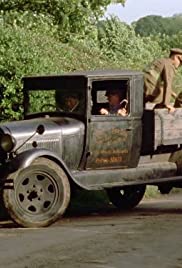
THE CASE OF THE MISSING WILL
UK, 1993, 50 minutes, Colour.
David Suchet, Hugh Fraser, Philip Jackson, Pauline Moran, Beth Goddard, Rowena Cooper, Richard Durden, Mark Kingston, Susan Tracy, Gillian Hanna, Terrence Hardiman, Edward Atterton, Neal Stuke.
Directed by John Bruce.
This is an entertaining Agatha Christie short story, one of the television series, and an opportunity to see Poirot in action, David Suchet' expert screen presence, along with Hastings, Chief Inspector Japp as well as Miss Lemon with a special mission.
The film takes up themes of equality of women with men, opening a decade after the suffragette movement, a rich man making his will but excluding a grant to his young ward. There is a transition to Cambridge in the mid 1930s, echoes of war, a debate about the place of women with the undergraduates and staff staunchly advocating the superiority of men. Poirot and Hastings have been invited to the debate.
The wealthy man had decided not to leave any grant to his ward but, in the 30s, has changed his mind and wants to change his will – but he is a murdered before that can happen.
Poirot investigates, Chief Inspector Japp is called in, there is a switch in the evidence and guilt sheeted home to the doctor who would have been granted the bulk of the estate for his research. However, it is obviously more complicated than that, especially as to who would be the heir if there was no will. There is an entertaining complication and a variety of suspects – with, eventually, a gathering everyone together, Poirot threatening possible suspects but then a revelation, certainly the least expected of the characters present as the murderer, scarcely noticed throughout the story, but with credible motivation.
1. The popularity of Agatha Christie mysteries? The television series? David Suchet as Poirot?
2. The opening in 1926? Andrew and his gathering, his will, his lawyer friend and his wife, the doctor and his research, Miss Campion? The children listening? The bequests, grants to the children, the remainder to the doctor, Violet being omitted? The children’s reaction?
3. The transition to a decade later? Poirot and his friendship with Andrew? Travelling with Hastings? The city? Late for the debate? The speeches? Andrew and the putting down of women? Robert and his defence? Violet and intervening from the gallery?
4. The issue of women, the decades after the suffragettes? Women’s rights, place in society? Miss Campion and her college within Cambridge? The separate giving of degrees to men and women? Andrew and his patriarchal attitudes?
5. Andrew, discussing his will with Poirot? His change of heart? Leaving everything to Violet? The phone call, his going to the Folly, the mysterious encounter, his death? The later finding of the container? Andrew being injected?
6. The doctor, his not getting the grant, his container being found, Chief Inspector Japp being called in, his quick conclusion, arresting the doctor at the funeral? Poirot dissatisfied, the container not there when he searched?
7. The will, disappearing? The issue of the inheritance? The lawyer, Poirot as executor of the will? The arrival of Chap?
8. Violet, young, strong-minded, the issue of the money, her love for Robert? His finishing his degree? The decision to go to America? Poirot appealing to them to stay? The graduation ceremony?
9. Andrew in Australia, the policeman and his wife, working with Andrew, their son, his benefiting from the will? The policeman upset with Poirot, his loyalties? The confrontation about the son being Andrew’s?
10. Miss Campion, staunch supporter of rights for women, relationship with Andrew, supporting Violet? Robert overhearing her with his father? In London, her being pushed down the escalator? Her surviving? The doctor’s revelation about her Caesarian birth? Poirot giving Miss Lemon a task, her investigation and the information?
11. Poirot gathering the group together, everybody present, the challenge to Robert as Andrew son? Poirot drawing back? Miss Campion and her child? The assumptions that the child was male, that Andrew’s killer was male? The truth about Violet as Miss Campion’s daughter? The revelation of the murderer – the least suspect in the group? Her motivation, wanting the money for her son?
12. A satisfying mystery – and an unexpected solution?